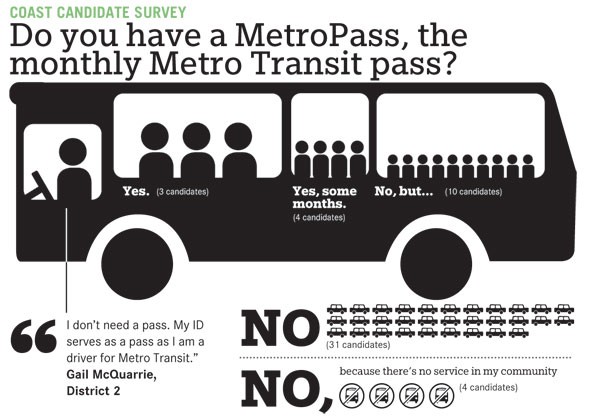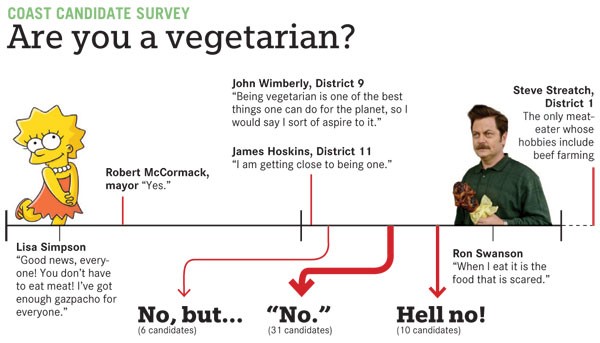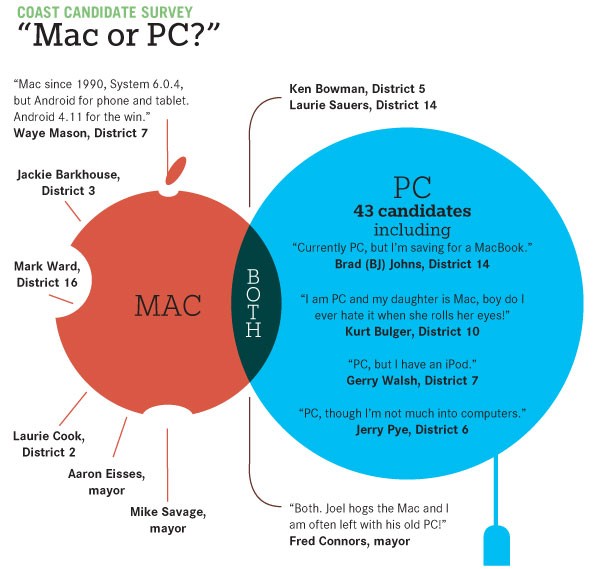@huskermould: Hell, it's not Peter Kelly. What else you got?
This election season, there's a lot of talk about leadership, vision and, above all, inspiration, especially when it comes to our new mayor. People seem to be expecting a man who will lead them out of the woods, a larger-than-life character who will validate the aspirations of Haligonians, "put us on the map," as the saying goes.
But this is exactly backwards. Instead of looking for inspired leadership at election time, we ought to be finding inspired citizenship. Not in politicians, not in some magical municipal saviour, but rather in ourselves.
As usual in our elections, the emphasis is on electing the right people as mayor and councillors, and not on creating a political culture that lasts after the election. And worse, as far as the political culture does exist, it's focused on the wrong thing.
See, Haligonians, like residents of every other city in North America, are in the midst of an urbanization craze, led by young professionals who see themselves as the future managerial class---they're epitomized by the 20- to 40-year-old networking group Fusion. Their cheerleader is Richard Florida, the supposed intellectual who trots out questionable academic work to justify all things urban. It's an idealized view of densely packed downtowns, people working on laptops in coffee shops, office workers rubbing elbows with artists, everyone zooming around on unlimited transit. These ideals are so worthy, the story goes, that if we double-down on them, they'll actually create wealth.
The über-urbanist craze is part lifestyle, part aspirational, but oddly in need of constant validation. It's not enough that some people like to live in the city, it needs to vilify people with other lifestyles and aspirations: the dreaded suburbs are bad, the bane of the city. At the local level, über-urbanists want a champion mayor, someone whose mere understanding of the urbanized utopian potential is enough to create it, so long as the mayor can effectively communicate that vision through social media.
Calgary mayor Naheed Nenshi is held up as the exemplar of a visionary leader by North American über-urbanists. Nenshi is Muslim, born of south Asian parents and essentially ran his mayoral campaign via Twitter, where he echoed über-urban sensibilities. Nenshi continues to use Twitter with abandon, becoming a humourous and likable cheerleader for all things Calgary: Every city initiative is awesome, every citizen project praiseworthy and never a contrary thought is uttered.
Nenshi hasn't actually achieved much. In office, he has crusaded for better transit, but is perhaps more known for criticizing "bickering" on city council, going so far as to bring in a therapist to quell dissent.
Still, there's no denying that, compared to Nenshi, Halifax mayor Peter Kelly is embarrassing. Kelly attends one of the more saccharine Christian churches, and is Anglo through and through. The last tweet from his @MayorPeterKelly account was issued February 7, two weeks before he abandoned his re-election efforts.
Worse, Kelly has less charisma than a salted slug. He's a finger-to-the-wind kind of guy, going wherever the political winds blow, but only after all the committees and interest groups have paved the way rhetorically. Vision? Leadership? Not from Kelly. Where Nenshi has spontaneous word play, Kelly has communications department-scripted press releases. When people consider Nenshi, they think, "Here's something interesting coming out of Calgary." With Kelly, it's "Boring old Halifax."
@loganattwood: The best we can hope for after the municipal election is for the status quo to suck less.
Maybe had Kelly stayed in the race, Mike Savage would have had to define himself more as the candidate with vision, but we'll never find out.
Savage is the consensus candidate for the establishment, originally urged to run as the one person who could defeat Kelly. After Kelly dropped out, Savage remains the establishment's candidate, but only in that tired "we already decided this" sort of way.
Savage is a nice guy, who as a backbencher MP got along well enough, voted somewhat left of centre and shook hands like nobody's business. Should Savage get elected, we'd have a mope-ish, workaday mayor who likes to talk to people, all while not signing illegal loan deals with concert promoters and writing himself cheques from a dead woman's bank account. These aren't bad things. They just aren't particularly inspiring.
Maybe you disagree. Maybe you find Savage or one of the other candidates greatly inspiring, especially compared to Kelly. All the same, inspiring or not, the rhetoric this election is focused on the wrong things.
Let's return to the über-urban craze. I know I sound like I'm opposed to it, but I'm not, really. I'm as citified as they come: I take the bus, sometimes five or six times a day. I hang out in coffee shops with my laptop. I have an iPhone, and use it to tweet all day long. I listen to podcasts while zooming around on transit.
Sign me up for most of the über-urbanist agenda---especially the parts about better transit and increased density (with lots of caveats). But the craze misses what's really important.
There's another mayor celebrated by the über-urbanists, a fellow named Gustavo Petro, mayor of Bogota, Colombia. The über-urbanists like Petro because he's a champion of livable cities, and unapologetically promotes urban parks and transit. But the über-ubanists aren't understanding Petro's whole package.
I like Petro, too, and have tweeted some of his sayings. Here's one: "A developed country is not a place where the poor have cars. It's where the rich use public transportation." Lots of Halifax politicos liked that as well, and retweeted it, but it's hard to believe they understand the full meaning of Petro's words.
Petro is an old-school South American lefty. A guerrilla who took up arms against an oppressive right-wing government (for that he was imprisoned and tortured). Later, he was elected to the Colombian senate and exposed corruption in the ruling government, specifically the connection between the party in power, the drug lords and paramilitary groups. For that, his life was threatened, repeatedly.
For Petro, transit isn't a way for laptop-toting yuppies to feel good about themselves. Rather, transit is revolutionary, a radical initiative to provide social justice---a phrase he uses regularly: "public ethics and social justice go hand in hand," he says.
As part of that revolutionary approach, Petro recently seized thousands of privately owned abandoned buildings and vacant lots in the centre of the city and is turning them into housing for poor people.
The equivalent here would be for mayor Savage or Tom Martin or Fred Connors to send the cops out to rope off all empty lots downtown and increase business taxes to turn the seized property into city-financed resident-owned cooperative housing for the un- and under-employed.
Even when our mayoral candidates do give a head nod to "affordable housing," they're doing it in the context of "density bonusing" under HRM By Design rules that maximize developer profits. That is, they're on the wrong side of the class war.
In that vein, when Petro works to improve transit, he's siding with the unemployed and the working poor in the war waged upon them by the rich. When he says a developed country is one where the rich take transit, he's refusing to agree to the construction of more roads for cars so long as even one person living in a shack in the Soacha slum can't get a bus to work.
In contrast, judging by his recent conversation with reporter Chris Benjamin, it's apparent that a mayor Savage will not oppose the billion-dollar expansion of Bayers Road and Highway 102. That's a billion that could otherwise be spent on transit and affordable housing. Mike Savage is no Gustavo Petro.
At a recent mayoral debate, Connors said he wanted to send city staff and councillors to Bogota on the city's dime to study transit. Which is all well and good, but when he talked to reporter Lizzy Hill, Connors' idea for improving transit was to put the screws on working people a bit more, forcing bus drivers to work longer hours for no more pay. Fred Connors is no Gustavo Petro.
@robtough: This dull coronation of a campaign needs some effigy burning in the worst way.
Granted, Halifax doesn't have anywhere near the social and wealth inequalities as Bogota, but that just means they're that much easier to solve.
According to the Ecology Action Centre, a third of Nova Scotians don't have access to a car because they're too poor, old, young or infirm to drive. My own eyes tell me that rents on the peninsula are skyrocketing and people in marginal financial situations are being pushed off to Clayton Park, Dartmouth and Spryfield. Affordable housing and workable transit are therefore very much issues of social justice, underscoring the fundamental morality of how we run this town.
So yes, I'm with with the über-urbanists when it comes to building a densely packed city with lots of transit. But if that ideal doesn't start and end with social justice for everyone, and especially for the most marginalized, it becomes just another in a long history of managerial class gimmicks and fads that make some dough for the socially connected while working people and the poor get squeezed.
And no, the über-urbanist agenda does not create wealth, lifting all boats like a Reagonomics version of city planning. To give one example, the workers servicing the businesspeople who will supposedly flock to our new convention centre will mostly be paid near-minimum wages, reinforcing the wage trap in our economy. Without a social justice agenda, the über-urban dream becomes the reversal of the draining out of the city in the last few decades: the rich move back to the city, the poor get pushed out to the suburbs.
Orienting the economy to catering to the rich has all sorts of effects. Here's one: As I write this, word is leaking out that the province is "considering" outsourcing its finance department operation to IBM, in hopes of convincing the company to set up an office downtown. No doubt the deal will also come with millions of dollars in payroll rebates, and it wouldn't surprise me if IBM locates to the building above the convention centre.
The outsourcing scheme is almost poetic in its vileness. Three hundred people will lose their government jobs on Hollis Street, while another 300 get new, lower-paid jobs working for IBM two blocks up the hill on Argyle Street, at least until the entire operation is moved to Bangalore five years from now. Joe Ramia gets a publicly subsidized tenant for his publicly subsidized building. Some unfathomable government expenditure---$50 million? $100 million?--- underwrites the deal benefiting one of the most profitable corporations on earth, while not one nickel will be dropped into expanding services for the poor priced right out of the peninsula. And the whole thing will be packaged as part of the über-urban fantasy, supposedly jumpstarting Halifax to be that worker's paradise, Singapore.
A wannabe mayor with a social justice vision might have something to say about this, but if any candidates mention the province's outsourcing ideas, they'll no doubt be supportive because in the prevailing twisted rhetoric, it'll mean "good jobs for graduates," or whatever bullshit phrase the province's un-tendered PR campaign comes up with.
Contrast that to what a city focused on social justice might do. City councillors have been mouthing platitudes about an affordable housing ordinance for many years, and have done nothing to implement it. Such an ordinance would require all new developments to include a set percentage of affordable housing units, to give the working poor a chance to live there. Reno, Nevada has a "replacement ordinance"---whenever a large developer tears down affordable housing units to make way for something else, they've got to build an equal number of affordable units nearby. And at the very least, a "soft" rent control protecting long-term rentals, people who have lived in apartments for many years, ought to be implemented. There are lots of ways to address housing, already being used across North America. Halifax ought to follow suit.
When, rarely, candidates are asked about affordable housing and rent control, their fallback is to say, "Well, I'll work with the province to investigate, blah, blah, blah." But if provincial policy prevents the city from acting, a city focused on social justice could play its trump card: Put a freeze on the development of any housing except affordable housing, until the crisis is addressed in a meaningful way. The development industry holds immense political power---if the city played hardball, whatever resistance provincial politicos have to enacting affordable housing policies would buckle in a heartbeat. Alas, it looks like our mayoral candidates won't challenge the developers' political power either.
@Nicest_Girl_Evr: Boring white guys.
So why even vote? Well, because voting is a stick we wield to threaten our politicians. Understand that our non-visionary politicians are above all cautious, or---to put it another way---cowardly. In the end, most councillors and mayors will throw whatever principles or ideology they have right out the window when they come up against a passionate and engaged public. Gustavo Petro fought against corruption in the face of death threats. Our next mayor will collapse in the face of 10 phone calls from constituents. Our politicians are that afraid of our voting stick.
In recent years we've seen what happens when regular people give a shit about city government. There are two great examples: The Oval and "tax reform." In each case, most of council wanted to do one thing---get rid of the skating oval, pass "tax reform"---but because of an overwhelming response from the public, did the exact opposite. When people are engaged, it doesn't matter who's in office, the right thing is done.
Whoever it is, our next mayor has already demonstrated he won't step outside the protective bubble of the prevailing rhetoric, which at the moment is the über-urban agenda with no consideration of social justice. That's fine. It's our job to shift the bubble.
So voting is the least of our responsibilities. After the election, getting the city we want means doing the hard work of staying on top of the issues, joining and forming citizen groups pushing a social justice agenda, attending meetings, bird-dogging councillors and the mayor, being in their faces when we need to be in their faces.
That's the tough work of democracy.















